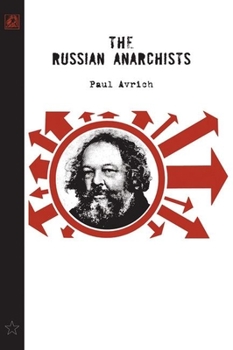The Russian Anarchists
Select Format
Select Condition 
Book Overview
In the turmoil of the Russian insurrection of 1905 and civil war of 1917, the anarchists attempted to carry out their program of "direct action"--workers' control of production, the creation of free rural and urban communes, and partisan warfare against the enemies of a free society. Avrich consulted published material in five languages and anarchist archives worldwide to present a picture of the philosophers, bomb throwers, peasants, and...
Format:Paperback
Language:English
ISBN:1904859488
ISBN13:9781904859482
Release Date:September 2005
Publisher:AK Press
Length:320 Pages
Weight:1.00 lbs.
Dimensions:0.9" x 5.4" x 8.4"
Customer Reviews
2 ratings
Good treatment of Russian anarchists in the early part of the 20th century
Published by Thriftbooks.com User , 14 years ago
Paul Avrich's scholarly discussion of the anarchist movement in Russia makes a nice contribution. For one thing, it demonstrates the strength of the anarchist movement in an inhospitable environment--first under Czarist Russia and, second, under the Bolsheviks. Avrich observes that (Page 4) "The Russian anarchists have long been ignored by those who regard all history through the eyes of the victors." He goes on to say (Pages 4-5) that "if one is to appreciate the true range and complexity of the Revolution of 1917 and the events that followed in its wake, the role played by the anarchists must be taken into account." There are two parts to the book--the first focuses on the events of 1905. At this time, discontent against the Czarist government bubbled over. There was an array of forces agitating against the government. Some were descendants of the Marxist tradition (such as Lenin) and others were advocates of Bakunin's anarchist perspective. Indeed, Peter Kropotkin's views were also represented among opposition to the status quo. Chapters 1-4 describe events of this era, including the anarchist terrorists, advocates of "propaganda of the deed" (Nechaev as one example) and syndicalists. In 1917, the Czarist regime crumbled. At the outset, Petrograd and the naval station at Kronstadt became libertarian outposts. Anarchists were a part of the revolution as were Bolsheviks. Kerensky's government, coming to power after the ousting of the Czar, was itself overthrown in October. Over time, the Bolsheviks worked to suppress opposing forces, culminating in Trotsky's attack on Kronstadt. Conflict continued between anarchists and Bolsheviks for a while, including Makhno's rebellion. In the end, though, Lenin's forces prevailed. The book is worthwhile for pointing out the role of anarchists in the run up to the revolution as well as during the early part of the revolution. Avrich's book is well researched and provides ample detail.
Concise, Comprehensive, Passionate History of this Important Social Movement
Published by Thriftbooks.com User , 15 years ago
Anarchism, as a political movement influencing contemporary societies and modern political thought, first emerged in Southern Russia, in the area known as the Pale of Settlement, extending from the Baltic to the Black Sea on the Western borderlands of the old Russian Empire. Here the indigent populations were persecuted mightily. The situation was not unlike the current crisis in Gaza. The afflicted were hard pressed by state sponsored terrorism. Avrich covers the entire history of Russian anarchism from its earliest roots in Russia, through the suppression of anarchism by the Bolsheviks in the 1920's, and follows the remainder of the lives of its leading lights through the 1960's. This well-produced study is documented with footnotes and index, a chronology, and a thirty-page annotated bibliography. All the major thinkers in the movement are discussed in the essential details: Bakunin, Kropotkin, Baron, Rogdaev, Chernyi, Makhno, Volin, Shapiro, Maksimov. In the context of today's pervasive patriarchal statism, fascism, and corporatism (all feeding off of each other), the anarchists have a message for us. We certainly do not want an emergence of the type of state-socialism witnessed in Russia and China, in America. However, capitalism, with its inherent indifference to suffering and wholesale destruction of the environment, cannot long continue as a viable form of social organization. The injustices are too great, the population numbers, too large. Centralized capitalist statism, as we have known it, is in its death-throes. Although ferocious assertions of power by those in authority have, are, and will be instantiated, sooner or later, chaos will ensue if we stay stuck on our present course. A decentralized, democratic, decision-making process holds the promise of better way of life. We must learn to govern ourselves, by ourselves, as a society organized on the basis of the voluntary cooperation of free individuals. This vision of the future was the dream of the anarchists. Passionately written by the late Paul Avrich (August 4, 1931-February 16, 2006), whose massive research on the history of anarchism is part of the Library of Congress, this easily read and meticulously documented volume is the best overview of the development of these crucial ideas available.





